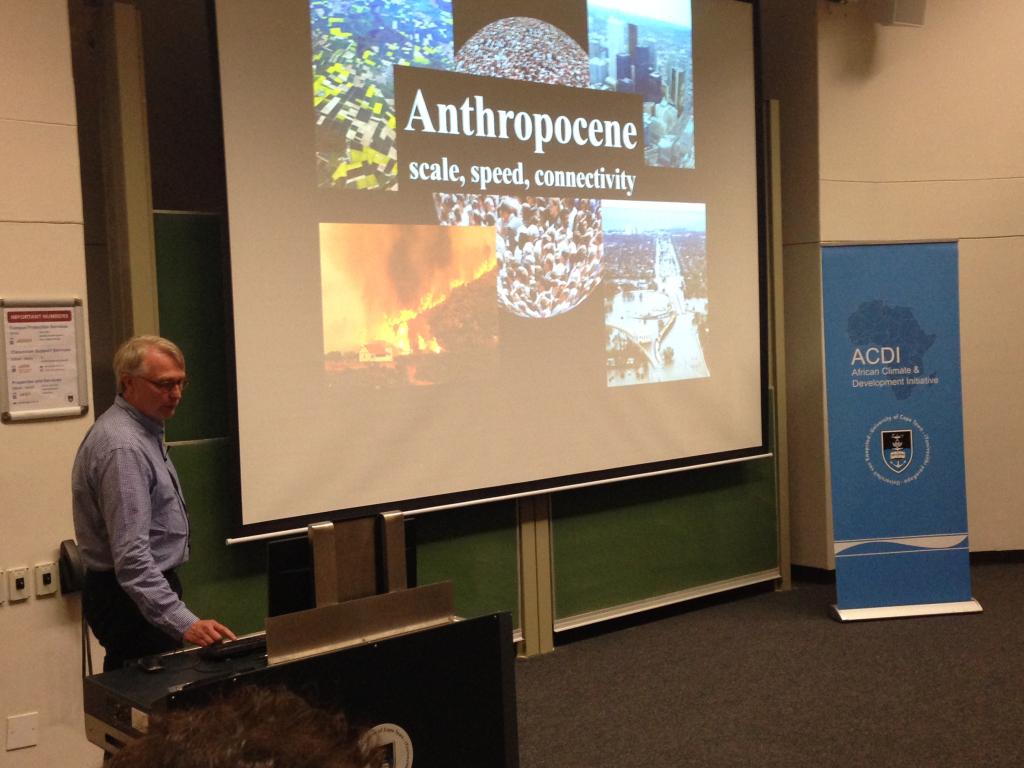Reconnecting development to the biosphere

On Thursday 16 October, ACDI hosted a public lecture with Swedish Professor Carl Folke, speaking on “Reconnecting development to the Biosphere.” Prof Folke is the Founder and Science Director of the Stockholm Resilience Centre at Stockholm University and the Director of the Beijer Institute of Ecological Economics of the Royal Swedish Academy of Sciences. His research focuses mostly on ecosystem dynamics and management, and at the open lecture he started off with the following thought-provoking statement: “People are embedded parts of the biosphere and shape it, from local to global scales, from the past to the future. At the same time people are fundamentally dependent on the capacity of the biosphere to sustain human development.”
He explained that we have evolved from a small world on a large planet to a large world on a small planet. We are currently in an Anthropocene period – a biosphere shaped by humanity – and according to Folke the scale, speed and connectivity that are characteristic of our development is significant. “If you think about it, it is quite a fantastic achievement of a single species who manage to live in relative peace across large areas and who have established democracies.” Prof Folke adds that “humans have changed the way the world works, now they have to change the way they think about it.”
50% of the global population live in urban environments and have become completely disconnected from the earth. We are reliant on natural assets, ecosystems and their associated services, even if this dependency is not obvious. With climate change, resilience is at the core of thinking about ecosystems and the social dynamics within them. According to Folke, resilience is defined as our capacity to live with change, incremental and abrupt, and to continue to develop. He adds that resilience thinking is based on three core legs: persistence (continually change), adaptability (adjust responses), transformability (transform yourself out of situation) – but none of these are recovery resilience (going back to the way it was before). Folke explained how the destruction of certain types of ecosystems is making us less resilient – and therefore less capable to adapt – to climate change.
In his research, Folke calls for social-ecological transformations in the face of complexity and uncertainty. This approach views humanity as an embedded part of the biosphere, depending on the generation of ecosystem services for human wellbeing. At the same time these ecosystems are being shaped from local to global scales. This led Folke to speak about transnational corporations as keystone actors in our global development. Research has linked a few individual companies to marine ecosystems worldwide, investigating the potential role these companies can have in shaping marine ecosystem dynamics through their catch of individual species. These researchers have examined the companies’ worldwide networks of operations and their involvement in international policy.
Some of what they found was that 13 companies (0.5% of registered fishing and aquaculture companies worldwide) are responsible for 11-16% of the total global catch, and in some areas up to 40%. These companies are involved in all the big fisheries worldwide, handling more than 208 species from 102 countries/territories. These companies also participate in policy processes, which makes them “keystone actors in the Anthropocene” and therefore important in how the earth operates.
Companies including Maruha nichiro, Thai Union, Nissui, and Marine Harvest dominate global production revenues and volumes. According to Folke they control globally relevant segments of production and connect ecosystems globally through transport and interaction, some of the reasons why they should be treated as already key actors in our ecosystem management. Folke ended his lecture by saying that the earth can be a safe operating space for humanity if we are smart enough.